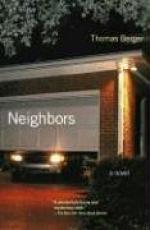|
This section contains 214 words (approx. 1 page at 300 words per page) |

|
[The chain of events in "Neighbors"] makes no sense. Nor will the novel ever provide a key to why Earl's placid suburban life has suddenly gone haywire. On the other hand, it makes all the sense in the world, the way a dialogue by Eugene Ionesco makes sense. "Neighbors" parodies all the rituals of neighborliness—the competitiveness, the bonhommie, the striving for civility in the face of what seems to be barbarism—and compresses into a single day a lifetime of over-the-back-fence strife.
I do wish the surprise ending flowed a little more logically out of the plot's beguiling irrationality, and that Mr. Berger had explained the mysterious reappearance of a missing house key—which pokes a small black hole in the plot into which a little of its energy leaks. Still, I read the novel feeling by turns curious, irritated, enraged, amused, and frightened, but never for...
|
This section contains 214 words (approx. 1 page at 300 words per page) |

|


